After a dramatic short-term drop in volumes, Ukrainian postal services provider Nova Poshta is now delivering more parcels than it did when the war started but with infrastructure damage, as shown in the photographs below. Nova Poshta’s couriers, who keep delivering in the face of a terrible assault on Ukraine’s infrastructure, are one tough band of brothers and sisters. Mirek Gral, vice president of Last Mile Experts, talks to Oleksandr Bulba, CEO of Nova Poshta, about the logistics company’s activities during the Russian invasion.
Mirek Gral (MG): Oleksandr, thank you for taking the time to share information about the situation in Ukraine and your company’s development plans. In Ukraine, you are a brand ubiquitously recognized and valued by customers. Please explain to our readers the activities of Nova Poshta.
Oleksandr Bulba (OB): Ukraine is a big country. At the outbreak of the war, the population was over 43.8 million in an area of 603,700km2. One of the big operational challenges was to ensure effective delivery of parcels throughout the country over very long distances. As an example, I can say that the distance from Lviv to Luhansk is about 1,350km, which is more or less as much as from Warsaw to Brussels. Before the war, the motto of Nova Poshta was ‘speed, proximity, ease’.
Our network consists of about 10,000 locations in Ukraine, including partner points, PUDO points, parcel lockers, regional terminals and sorting facilities. We employ over 32,000 employees and are one of the largest employers in the country. To be able to offer our customers the highest level of service, we developed our warehouse infrastructure, built seven distribution terminals and plan to open two more, in Odessa and Kyiv. Last year, we also launched a regional hub with a high level of automation in Dnipro, and in the spring of this year another one in Zaporizhia. In addition, we have modernized 10 regional terminals. At the same time, we started using robots in several hubs and conducted tests using drones in the ‘middle mile’ area. Modernization of infrastructure was forced by an increase in volume by an average of about 20% per year. In 2021, Nova Poshta handled 372 million parcels, or more than 1 million per day.
To be even closer to our customers, we have expanded the network of PUDO points and parcel lockers. Our network has been built in such a way that it takes no more than five minutes to reach the nearest branch or parcel locker from home or workplace. Parcel lockers are located near shops, shopping centers, public transportation stops, at gas stations and housing estates. Such infrastructure allows customers to freely decide where and when they will pick up their parcels, without having to wait for the courier at home or work.
MG: People may not be aware that your company is the second-largest operator of parcel lockers in Europe. The leading operator is InPost in Poland with slightly more than 20,000 machines; your network is over 13,500 parcel lockers, and the third-largest operator is DPDHL in Germany with about 9,000 lockers. Tell us how you’ve developed the network.
OB: Yes, it’s true, we are very proud of it and customers really like to use our parcel lockers, which are largely produced in Ukraine by Modern Expo, based in Lutsk. Parcels can be collected and sent around the clock, 365 days a year, without queues, at a convenient time, and in some places, you do not even have to leave your building because the lockers are set up in apartment blocks. We focus on improving the quality of customer service, all possible simplifications and conveniences for the customer. The development of the network of parcel lockers and PUDO points is one of the main elements of our strategy for the upcoming years; we want to be as close as possible to our current and future customers. Unfortunately, some of our operational infrastructure has been destroyed during the war, but we are doing everything in our power to ensure that our customers have access to services as much as possible even in areas heavily affected by the conflict.
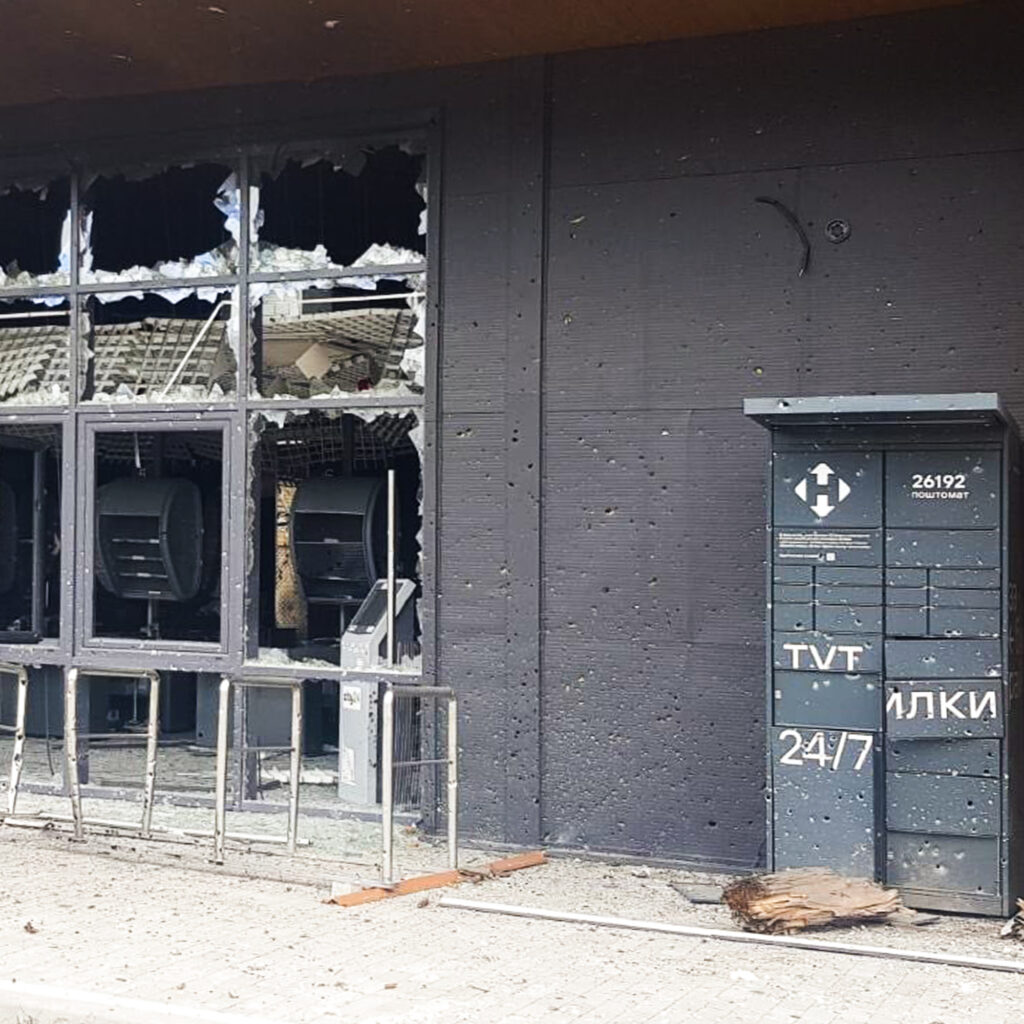
To meet the needs of our customers, we have made it easier to use our services by improving our digital tools, websites and mobile applications. To send a parcel, you do not need to know all the address details of the recipient, it is enough to enter their mobile phone number. It is a very useful solution, especially in these difficult times when many people are away from home. We have also introduced the possibility of compiling invoices or bills directly from the mobile application. All our activities in this area make the operation of the website or application easy, convenient and intuitive.
MG: Please tell us how the outbreak of the war in Ukraine affected the company’s activities and development plans in your network.
OB: The war has unfortunately forced us to adjust our plans; we are suffering losses in people and infrastructure but we continue to invest in the development and economy of the country, expanding our own network and following our strategy of ‘speed, proximity, ease’.
In the first week of the war, our company and many other companies throughout Ukraine almost stopped, and volumes fell overnight by 95%. Before the war, our logistics flows were divided. Loads passed through cargo terminals, and parcels through the courier network and PUDO points and parcel machines. At the beginning of the war, we changed the logistics model, adapting to the situation and operational capabilities limited by warfare. Since the volume of shipments in the first days decreased significantly, there was no need to operate all our hubs and depots. Therefore, we excluded about 80% of facilities from the logistics chain and reduced the depot network.
In the first days, only 30 out of 141 terminals and hubs were operating. We delivered shipments once a week, then every three days as the volume of shipments increased, and we restored operations at all our usable facilities. With the decline in turnover at the beginning of the war, we understood that it was very expensive to provide two separate distribution networks. Therefore, the model was rebuilt, and all packages and cargo were handled only in courier depots and hubs.
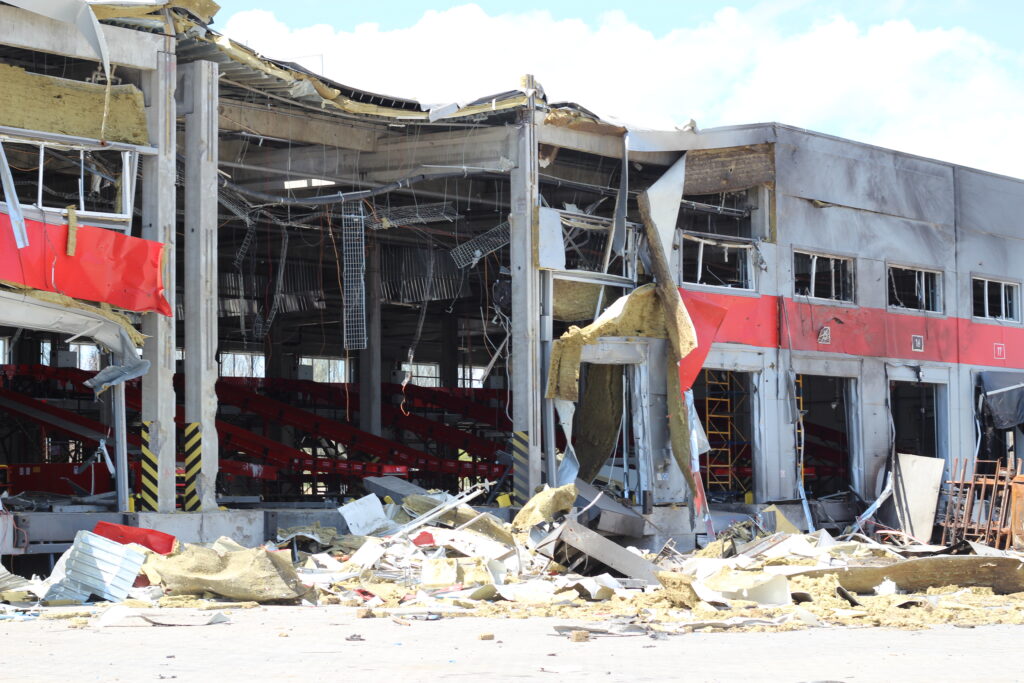
Then we implemented new operational solutions so that the storage of parcels and cargo took up less space; we built special racks allowing for effective use of our storage space. To illustrate the needs resulting from operational activities conducted during the war, a good example is the change in the number of shipments stored in the depot (own collection or unsuccessful delivery attempt due to the absence of the addressee): in February, before the outbreak of war, about 1,000 packages were stored in one depot, while in March there were already 30,000 a day. This flexibility helped us resume work and get closer to pre-war operational indicators.
As of November 2022, Nova Poshta has restored 100% of the network: we have 22,600 customer service points, including 9,000 postal departments, PUDO points and nearly 13,600 parcel lockers. We were able to adapt our infrastructure to operate without electricity, as the aggressor destroyed nearly 50% of critical infrastructure, including energy utilities across the country. We are also developing solutions based on mobile units that can operate on solar batteries and power generators. They are installed in the occupied territories, where there is no electricity and it is not possible to quickly open a stationary department due to severe damage to urban and logistics infrastructure.
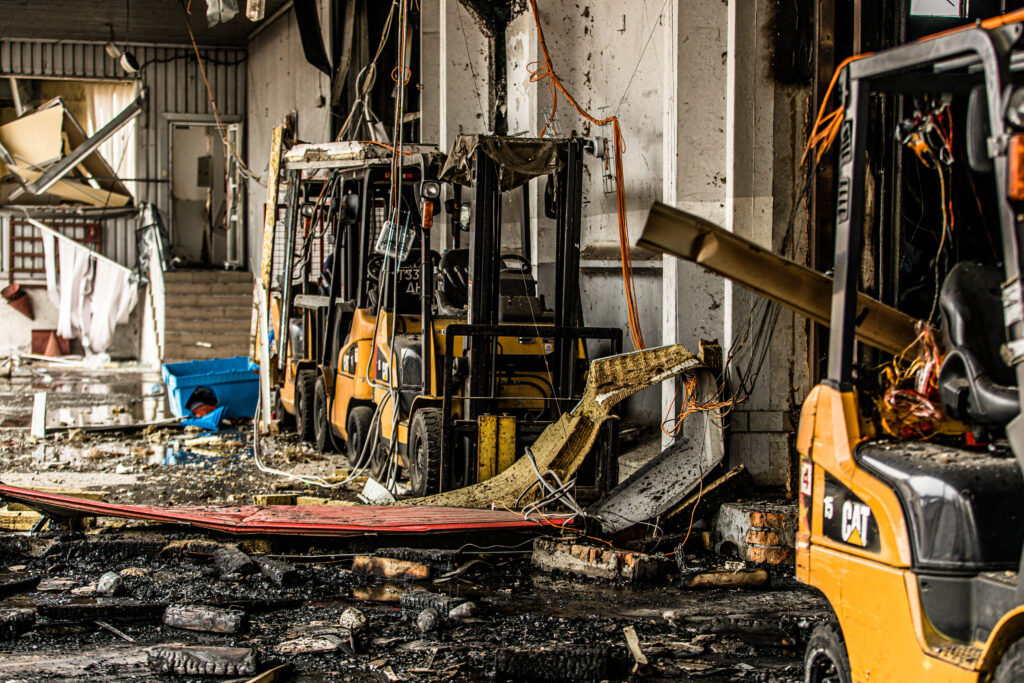
Even during the war, we built new depots and hubs in the Odessa and Kyiv regions and we have rebuilt facilities damaged by shelling in Kharkiv, Chernihiv and Mykolaiv. In addition, we have opened 948 new branches and continue to expand our own network of parcel lockers. Since February, almost 260 new units have been installed throughout the country. We have developed new services dedicated to parcel lockers, such as the Transfer Point service, where you can simply leave the parcel for the recipient.
MG: How have the war and the humanitarian and economic crises affected your business and service development strategy?
OB: Let me start by saying that we were very grateful to the Polish for the fact that when the war began, Poland became the first country to accept Ukrainian refugees. According to statistics, more than nine million people were evacuated from Ukraine abroad (as reported by Reuters, citing the UN High Commissioner for Refugees), of which 3.37 million Ukrainians were accepted by Poland. This means that now Ukrainians make up about 8% of the Polish population.
We constantly hear from our clients that they miss us, that they miss our services, to which they were so attached when they lived in Ukraine. The main goal of the development of our company is to be focused on the customer and to follow them and their needs. That is why we immediately started looking for a reliable partner for cooperation in Poland, who has a wide distribution network and could offer a portfolio of services similar to those that Nova Poshta offers to its clients in Ukraine. Therefore, we have established cooperation with InPost, which is the owner of the largest network of parcel lockers in Poland (Paczkomat) and is the leader in B2C deliveries. At this point, I would also like to thank the management of InPost not only for supporting our project but also for the huge contribution to humanitarian aid for the citizens of Ukraine. Thousands of tons of food, necessities and clothes organized by InPost probably saved many lives in our country.
Thanks to cooperation with InPost, we were able to launch a new type of service consisting of the delivery of parcels from Ukraine to Poland and from Poland to Ukraine. As a result of the implementation of new operational solutions, cooperation with InPost and starting our own business in Poland under the Nova Poshta brand, the cost of delivery to Poland decreased 2.5 times compared with the previously used solution. This allowed us to offer our customers very attractive prices of services for shipments handled on the Ukraine – Poland – Ukraine route.
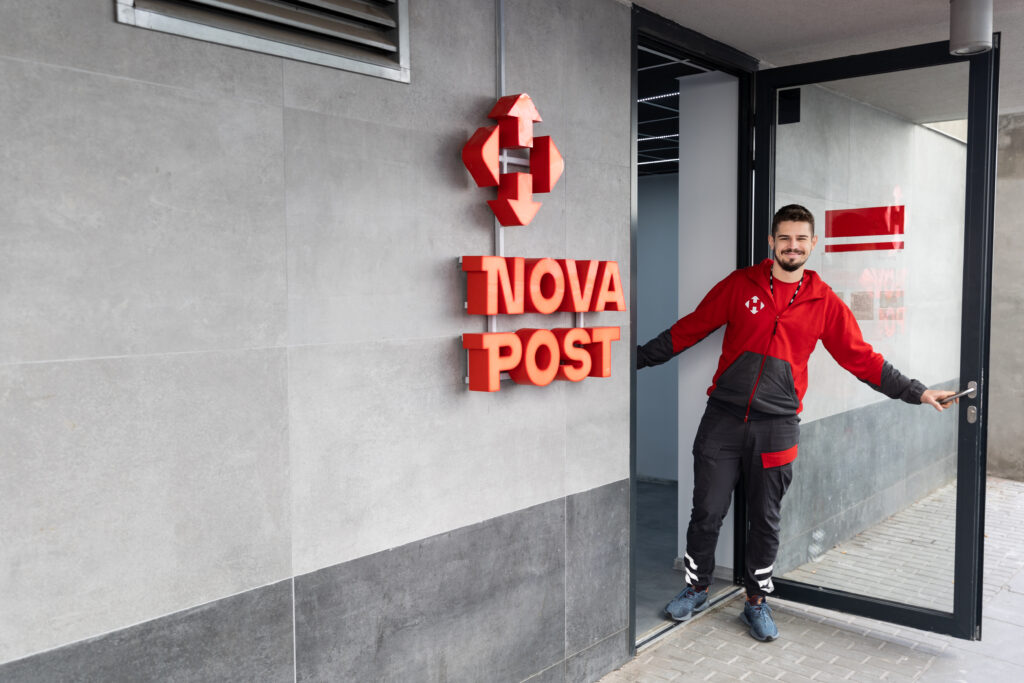
As I mentioned earlier, we want to be close to our customers, which is why we are opening our branches in Poland. These are PUDO points extended with packaging services and fitting rooms, as is offered in Ukraine. Our clients are mainly Ukrainians who are accustomed to a wide range of additional services and the appearance of our points, and they will be served in Ukrainian.
So far, as of the beginning of November 2022, we have created points in Warsaw, Krakow, Poznan and Rzeszow – a total of eight locations through which Ukrainians can send packages home and receive them from relatives and friends in Ukraine. In addition, we provide work for Ukrainians who live in Poland and know Polish.
As far as the development strategy in Poland is concerned, by the end of the year we plan to open 11 more customer service points (PUDO) and two cargo branches in Poland for handling oversized shipments, mainly for the B2B segment.
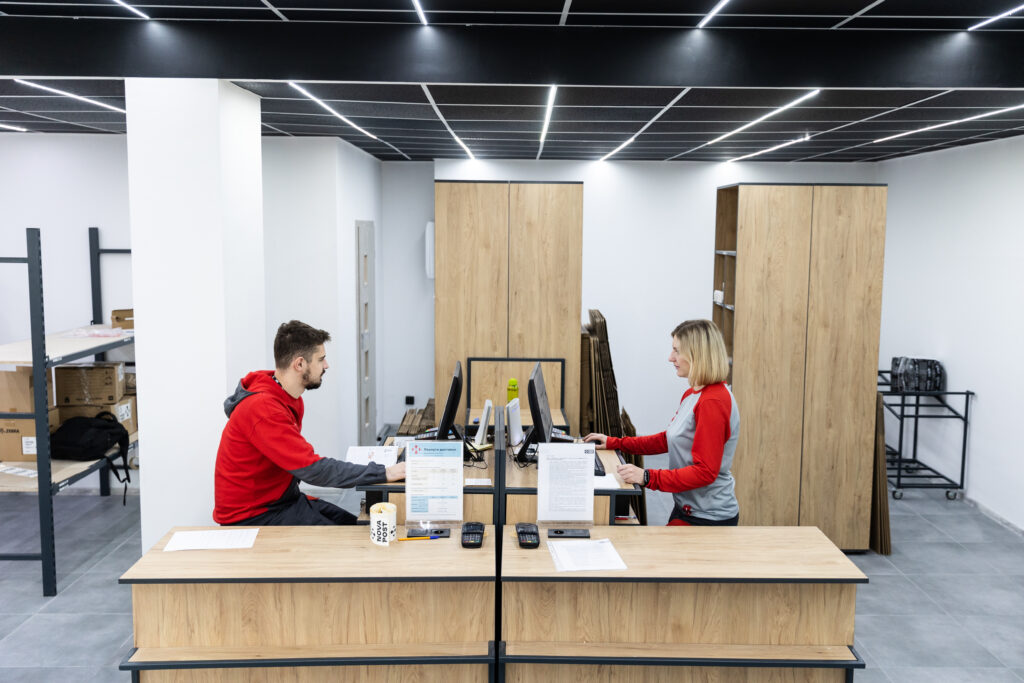
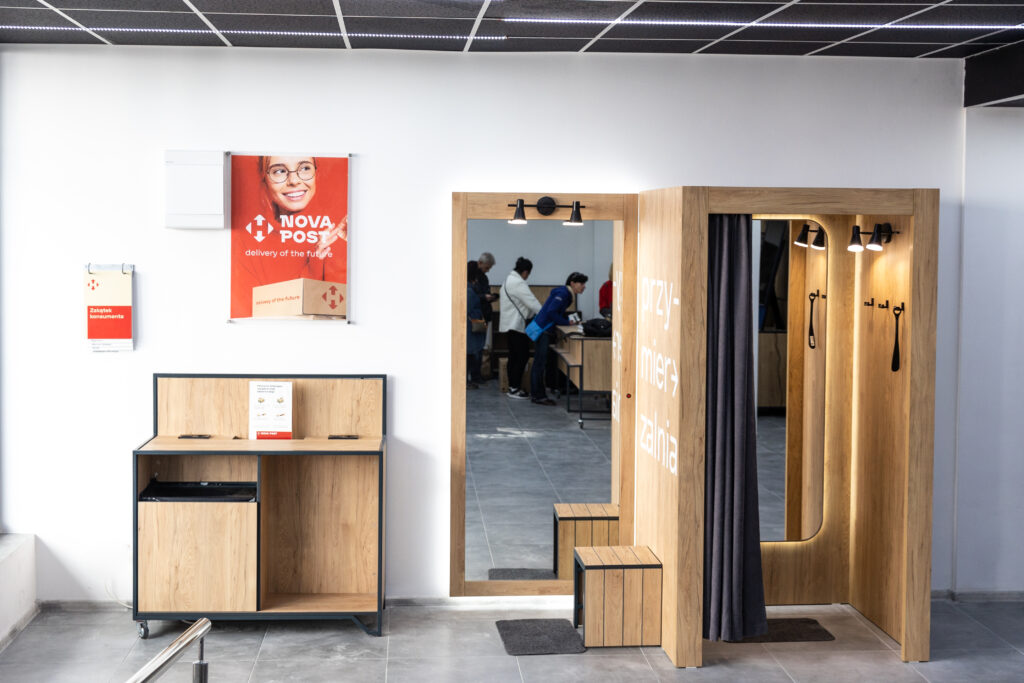
MG: And what is the situation in e-commerce? What are online sales like in Ukraine when you consider many companies have lost their offices and warehouses, and shortages in the supply of electricity are also a huge obstacle?
OB: The change in the logistics market was already noticeable in March-April. The evacuation of companies (including equipment, warehouses, stock, etc) to safe regions, the sending of personal belongings from home abroad and throughout the country, all this affected the structure of volumes and the average weight of the shipments. Before the war, the average package weight was about 7kg; in the first months of the war it was twice as much. Since mid-March, we have transported about 350,000 shipments per day, of which 60% were online orders. In June-July, we had an average of 500,000-600,000 shipments per day. If we look at these numbers in percentage terms, in March we reached 30% of the pre-war volume of parcels, in May it was already 65% and in July it was 80%.
We worked 24/7 to maintain and restore our operational capabilities, understanding that the delivery market is closely related to the e-commerce sphere, since about 70% of our deliveries are orders from online stores. We spent a lot of time trying to reach our customers, motivating and encouraging them to start working again, because after repeatedly restructuring logistics models, we were ready to help and cooperate. To support online sales, Nova Poshta conducted over 100 marketing campaigns with partners, organized free delivery for online stores that began to resume work and developed a dedicated website on which we collected over 500 online stores. We sent notifications to our customers, informing them of which stores are already open. We have developed and implemented additional useful tools and services, such as delivery for 35 hryvna (just under €1), provided that the sender pays for the service before it is provided. We have done everything in our power to help our partners and customers ‘return to normality’, proving that we are a reliable partner and offer support to Ukrainians in the most difficult moments.
The demand for international deliveries to Europe has increased significantly, as more than nine million Ukrainians have left the country and they also need to use our services. During the war, Nova Poshta Global delivered more than 66,600 international packages as part of its new Goods from Home Abroad service. Most shipments were sent to Poland (over 27,000) and Germany (nearly 18,000). In just six months of this year, international exports and imports amounted to 1.9 million parcels.
Summing up the activity so far in 2022, Nova Poshta delivered over 189 million parcels in nine months, which is 19% less than last year, in peacetime. We believe that the war will end soon and we will start to rebuild our economy, which will undoubtedly have a positive impact on the entire transportation industry.
MG: Oleksandr, thank you very much for your time. I am truly impressed by what Nova Poshta is doing for your country, economy and citizens. On behalf of our readers, I wish Ukrainians a quick return to peace and reconstruction of the country.



